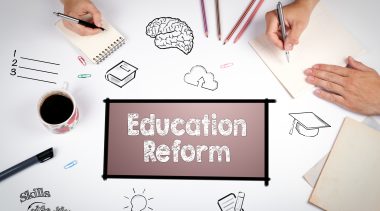Christian Barnard is assistant director of education reform at Reason Foundation.
Barnard's work includes research and analysis of state education and school district finance systems, with the goal of making them more equitable and innovative.
Barnard's writing has been featured in outlets including USA Today, Los Angeles Daily News, Washington Times, and The Hill, among others.
Barnard previously worked with the Foundation for Government Accountability, where he conducted research on labor policy and criminal justice. He also worked for the Pioneer Institute.
He holds a bachelor of arts degree in philosophy and economics from Messiah College.
-
The Covid-19 Economic Fallout Is Going to Hurt Education Budgets, Here’s What States Can Do to Protect Vulnerable Students
Leaders should learn from past mistakes and make school finance reforms to ensure that low-income and disadvantaged students aren’t disproportionately harmed.
-
Infographic: 3 Rules to Help School Finance Systems Impacted By Coronavirus
COVID-19 is prompting a harsh new fiscal reality for states and school districts. Here's what state and school district officials can do to adapt.
-
School Choice Is Disrupting Public School System—And That’s the Point
Blame school districts for the flaws they've allowed to fester, not parents for wanting better education for their kids.
-
How Competition From Charter Schools May Change Schools’ Budgeting Decisions
This study's results suggest that school choice competition could improve outcomes for students who remain in traditional public schools by affecting the allocation of scarce education dollars.
-
Rethinking Student Loans and Financial Aid Could Reduce the Cost of College and Student Debt
It’s hard to find another sector in which the market for loans is so unresponsive to return on investment than it is with student loans in higher education.
-
Sensible Education Reforms to Complement School Choice
Conservatives, libertarians and progressives all agree that tax dollars should be distributed fairly so that all students are treated equally and disadvantaged kids aren’t shortchanged.
-
Why the State Takeover Hurt Detroit’s Public Schools and What to Do Now
A study finds the 15-year period that DPSCD was largely governed by state officials rather than a local school board was a “costly mistake.”
-
Infographic: How Indiana’s School Finance System Works
Indiana should reduce reliance on local revenues and move funding to a state formula so charter schools and districts are funded on an equal footing.
-
Infographic: How South Carolina’s School Finance System Works
A better alternative would be to give local leaders autonomy over how education dollars are spent.
-
Liberty University: A Cautionary Tale From a School Receiving $770 Million Annually From Government Sources
Reforming Liberty University doesn’t mean compromising its mission.
-
State Takeovers Are Not the Best Solution When a District Is In Financial or Academic Distress
A growing number of school districts are finding success in giving principals the flexibility to make decisions through student-based budgeting.
-
Don’t Let State Education Reforms Overshadow Need For District Change
Individual school districts, not states, are the true gatekeepers for how school-level resources are used.
-
Public Schools Are Not Value-Neutral
How is it possible to take and teach a neutral position?
-
Weighted Student Funding Programs Continue to Show Promising Results
A survey of 20 school districts across the country that use some form of student-based budgeting finds it is working, particularly in large urban school districts.
-
I Worked as a Janitor To Keep My Student Loans Low. Wiping Debt Punishes Students Like Me.
Not only does canceling all student loan debt make the sacrifices I made meaningless, Bernie Sanders' proposal would benefit people who need help the least.
-
To Ensure Equitable Funding for Low-Income Students, Fixing Title I Isn’t Good Enough — It Needs to Be Rebuilt From Scratch
Title I developed a dizzyingly complex funding mechanism that poses serious equity concerns for America’s poor children.
-
Paying More Attention to Where and How Education Funding Is Spent
The achievement gap between advantaged and disadvantaged U.S. students has remained unchanged for nearly 50 years.
-
Examining Sen. Kamala Harris’ Plan to Give All Teachers Raises
There also needs to be a discussion about pension debt and the real culprits behind stagnant teacher salaries.


















